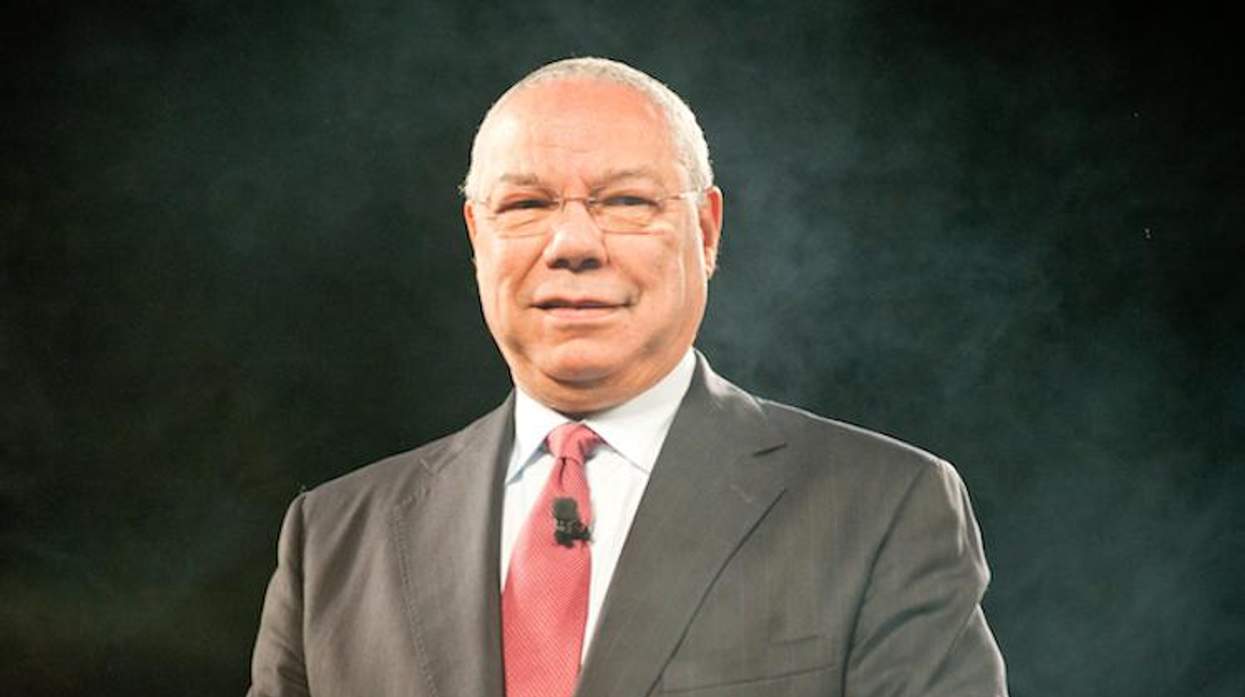Colin Powell, the military leader who was instrumental in enacting the "don't ask, don't tell" policy but later supported its repeal, has died of COVID-19 complications.
Powell died Monday morning, his family said in a Facebook statement. He was 84 and had contracted COVID despite being fully vaccinated. He had been treated for the disease at Walter Reed Medical Center. He also multiple myeloma, a cancer of the blood cells.
When Bill Clinton became president in 1993, promising to lift the ban on lesbian, gay, and bisexual people in the military, Powell was chairman of the Joint Chiefs of Staff. He opposed lifting the ban (under which many LGB people had been discharged and others served in the closet) and said in testimony to Congress that open service by LGB troops would be "incompatible" with military readiness. In notes from meetings with Clinton at the time, released by the Clinton library in 2014, it was revealed that Powell had said homosexuality would be "a problem" for the military and that parents of service members might be worried about straight and gay troops sharing quarters.
Resistance from the military and many members of Congress led to the compromise of "don't ask, don't tell." The idea was that LGB service members could not come out, but the military would not try to root them out either. It was initially seen as an improvement over the outright ban but didn't work out that way.
Clinton said in 2010 that he regretted DADT and that Powell, as one of its key supporters, misrepresented how it would work. "Now, when Colin Powell sold me on 'don't ask, don't tell,' here's what he said it would be," Clinton told Katie Couric on CBS News. "Gay service members would never get in trouble for going to gay bars, marching in gay rights parades, as long as they weren't in uniform. That was what they were promised. That's a very different 'don't ask, don't tell' than we got." Indeed, under DADT the military continued to investigate service members' sexual orientation and discharge them -- about 14,000.
In 2010, when President Barack Obama floated the idea of reviewing DADT with an eye to repeal, Powell, by then a private citizen, endorsed the plan. Secretary of Defense Robert Gates and Joint Chiefs Chairman had said they supported Obama's proposal.
"In the almost 17 years since the 'don't ask, don't tell' legislation was passed, attitudes and circumstances have changed," Powell said in a statement to The New York Times, adding, "I fully support the new approach presented to the Senate Armed Services Committee this week by Secretary of Defense Gates and Admiral Mullen." DADT was repealed by Congress in 2010, and the repeal went into effect in 2011.
In his later years, Powell also supported marriage equality. "I have no problem with it," he told CNN's Wolf Blitzer in 2012, after Obama had endorsed legalization of same-sex marriage. "In terms of the legal matter of creating a contract between two people that's called marriage and allowing them to live together with the protection of law, it seems to me is the way we should be moving in this country. And so I support the president's decision."
Powell was the first Black chairman of the Joint Chiefs, a position to which he was appointed in 1989, under President George H.W. Bush, and the first Black secretary of State, in President George W. Bush's administration. He had joined the military in 1958, saw combat in Vietnam, and eventually rose to general.
In 2003, during the second Bush administration, Powell presented the case for war with Iraq to the United Nations, saying Iraq possessed weapons of mass destruction. But no such weapons were ever found. He later said he regretted the action, which he called a "blot" on his record. He left the secretary of State position in 2005.
Powell, nominally a Republican, said he had voted for both Democratic and Republican candidates over the course of his life. He endorsed Obama in both his runs for president and was a strong critic of Donald Trump, calling him a "national disgrace." After the insurrection by Trump supporters at the U.S. Capitol this year, Powell said he could no longer consider himself a Republican.




































































Charlie Kirk DID say stoning gay people was the 'perfect law' — and these other heinous quotes